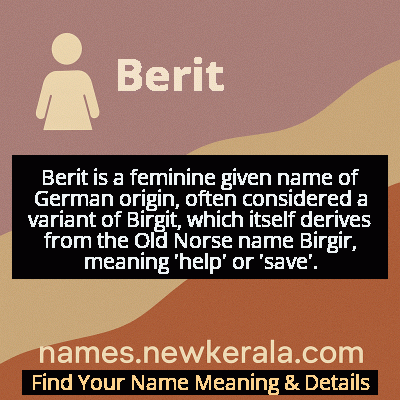Berit Name Meaning & Details
Origin, Popularity, Numerology Analysis & Name Meaning of Berit
Discover the origin, meaning, and cultural significance of the name BERIT. Delve into its historical roots and explore the lasting impact it has had on communities and traditions.
Name
Berit
Gender
Female
Origin
German
Lucky Number
9
Meaning of the Name - Berit
Berit is a feminine given name of German origin, often considered a variant of Birgit, which itself derives from the Old Norse name Birgir, meaning 'help' or 'save'.
Berit - Complete Numerology Analysis
Your Numerology Number
Based on Pythagorean Numerology System
Ruling Planet
Mars
Positive Nature
Generous, passionate, energetic, and humanitarian.
Negative Traits
Impulsive, impatient, moody, and can be overly emotional.
Lucky Colours
Red, maroon, scarlet.
Lucky Days
Tuesday.
Lucky Stones
Red coral, garnet.
Harmony Numbers
1, 2, 3, 6.
Best Suited Professions
Military, sports, philanthropy, leadership roles.
What People Like About You
Courage, energy, leadership, generosity.
Famous People Named Berit
Berit Ås
Politician and Psychologist
Norwegian feminist pioneer who developed the theory of 'master suppression techniques'
Berit Nesheim
Film Director
Academy Award-nominated Norwegian director known for 'The Other Side of Sunday'
Berit Berthelsen
Athlete
Norwegian long jumper and pentathlete who won multiple European Championship medals
Berit Mørdre Lammedal
Cross-country Skier
Norwegian Olympic medalist and World Championship winner in cross-country skiing
Name Variations & International Equivalents
Click on blue names to explore their detailed meanings. Gray names with will be available soon.
Cultural & Historical Significance
During the 19th and 20th centuries, Berit became particularly popular in Norway and Germany as part of a broader trend toward simplifying traditional names while maintaining their cultural resonance. The name represents a fascinating example of how naming traditions evolve while preserving historical connections. In contemporary culture, Berit symbolizes the enduring strength of Scandinavian and Germanic heritage, serving as a reminder of the region's rich history of strong female figures who combined intellectual depth with practical action. The name's continued, though diminished, usage demonstrates how traditional names can maintain relevance through their timeless qualities and cultural significance.
Extended Personality Analysis
Individuals named Berit are commonly associated with a distinctive blend of intellectual prowess and practical wisdom. Their intelligence often manifests as sharp analytical skills and the ability to process complex information efficiently. Berits tend to be natural problem-solvers who approach challenges with methodical precision and creative thinking. They typically possess excellent memory retention and learning capabilities, making them quick studies in various fields. This intellectual capacity is frequently complemented by strong observational skills and attention to detail that others might overlook.
Beyond their cognitive abilities, Berits often exhibit emotional intelligence and perceptiveness that allows them to understand people and situations deeply. They tend to be excellent listeners who process information before speaking, making their contributions thoughtful and well-considered. While they may appear reserved initially, Berits usually develop strong, loyal relationships based on mutual respect and intellectual connection. Their combination of mental acuity and emotional depth makes them valuable friends, colleagues, and leaders who can navigate both logical challenges and interpersonal dynamics with equal skill. This balance of qualities often leads Berits to positions where both intelligence and empathy are required.
Modern Usage & Popularity
In contemporary naming practices, Berit occupies an interesting position as a classic name that has become somewhat rare yet remains culturally significant. While its popularity peaked in the mid-20th century, particularly in Norway where it ranked among the top 50 names during the 1950s and 1960s, modern usage has declined significantly. Today, Berit is considered a distinctive choice that honors Scandinavian heritage without being overly common. In Germany and German-speaking countries, the name maintains a presence as a sophisticated alternative to more popular names, appealing to parents seeking something traditional yet uncommon. The name's current rarity adds to its appeal for those looking for unique names with deep cultural roots. Interestingly, Berit has seen slight resurgence among parents interested in vintage names and those with Scandinavian ancestry living outside Europe. The name's easy pronunciation in multiple languages and its strong, clear sound contribute to its enduring, though niche, appeal in the global naming landscape.
Symbolic & Spiritual Meanings
Symbolically, Berit represents the convergence of ancient wisdom and modern intelligence, embodying the metaphorical bridge between tradition and progress. The name carries deep associations with enlightenment and clarity of thought, symbolizing the ability to discern truth and make wise decisions. In many interpretations, Berit represents the 'keeper of knowledge' – someone who preserves important information and insights while also advancing understanding through original thinking. The name's connection to strength and nobility suggests not just physical or social standing, but the strength of character and intellectual fortitude that enables true leadership.
Metaphorically, Berit can be seen as representing the 'northern light' of intelligence – clear, bright, and guiding. The name symbolizes resilience in the face of challenges, particularly those requiring mental strength and strategic thinking. In cultural symbolism, Berit often represents the ideal of the wise woman who balances practical knowledge with deeper understanding, serving as both a problem-solver and a source of wisdom for her community. The name's evolution from ancient roots to modern usage also makes it symbolic of cultural continuity and adaptation, representing how traditional values can be maintained while embracing contemporary perspectives.

